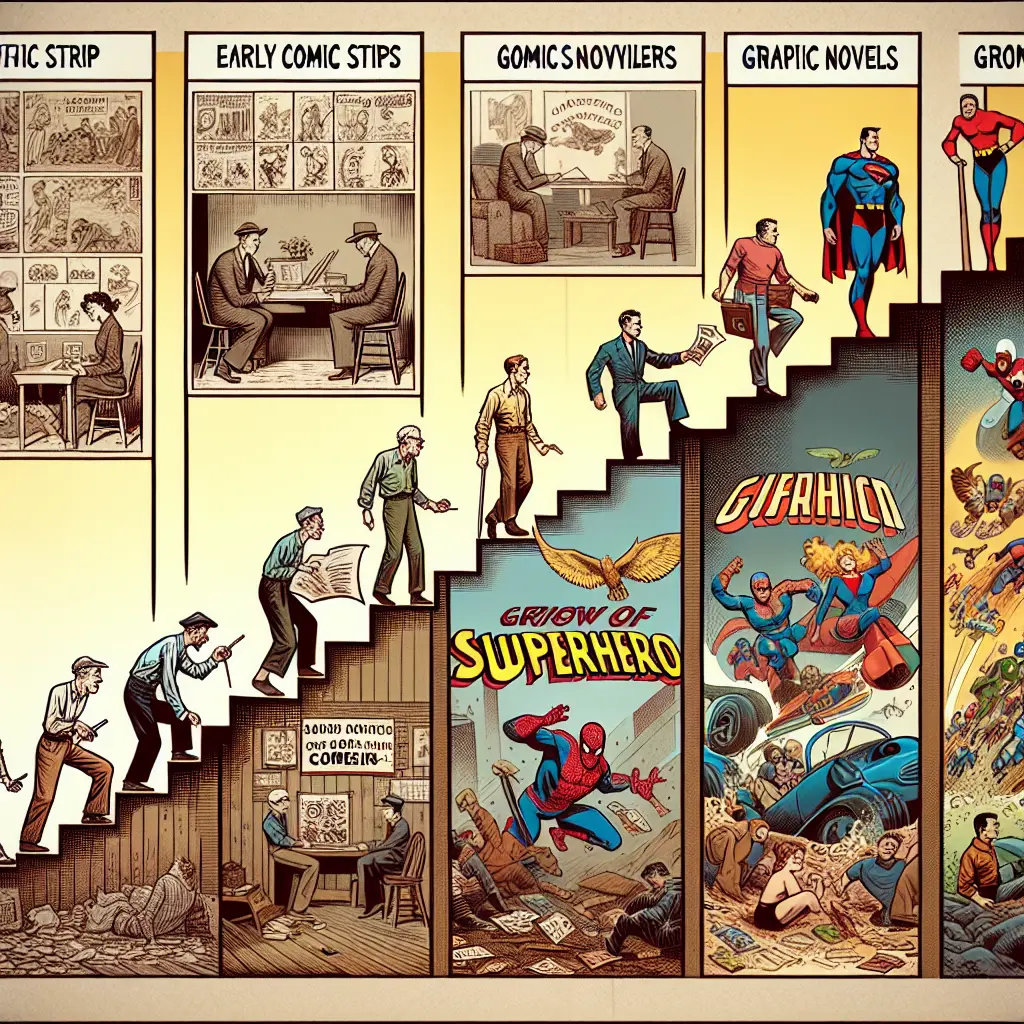
Marvel Comics has undeniably shaped the landscape of modern graphic novels and the broader comic book culture, weaving a rich tapestry that influences not only the superhero genre but also the entire graphic novel industry. The journey from the early comic strips to today's complex narrative structures showcases a profound evolution, deeply impacted by Marvel's innovative storytelling and character development. This exploration reveals how Marvel Comics' influence has permeated modern graphic novels, leading to significant shifts in art styles, narrative techniques, and the cultural perception of comics.
Marvel Comics' Legacy and Its Impact on Modern Graphic Novels
Marvel Comics has been a cornerstone in defining the superhero impact within the comic book culture. Characters like Spider-Man, Iron Man, and the X-Men have transcended their pages, becoming cultural icons. Marvel’s approach to building relatable superheroes with complex personalities and flawed characteristics has revolutionized the way characters are developed in graphic novels today. This Marvel narrative technique has encouraged a deeper psychological exploration of characters in modern graphic novels, making the stories more engaging and relatable.
The Evolution of Comic Book Art and Storytelling
The evolution of comic book art styles can largely be attributed to Marvel’s innovative approaches over the decades. From Jack Kirby’s dynamic compositions to Steve Ditko’s surrealistic style, Marvel has set trends that many modern graphic novels continue to emulate. These elements are evident in the way contemporary graphic novels use visual storytelling to enhance the narrative, creating a more immersive experience for readers.
Marvel’s storytelling prowess is not just limited to character development but extends to its cinematic narrative techniques. Recent updates from Comic-Con 2024 highlighted how Marvel Studios’ President Kevin Feige, not only shared his origin story but also revealed intriguing future projects, including updates on Spider-Man 4 and the integration of X-Men into the MCU (Marvel Cinematic Universe) [Source: Comic-Con 2024 Panel]. This seamless blend of narrative across mediums showcases Marvel's ability to adapt and evolve its storytelling techniques, influencing not just comics but also blockbuster cinema.
Graphic Novel Trends and Superhero Genre Transformation
The transformation of the superhero genre is a direct reflection of broader graphic novel trends, where there is an increasing shift towards more nuanced storytelling and complex character arcs. Marvel Comics has been at the forefront of this transformation, integrating societal themes and real-world issues into its narratives, making superhero stories a platform for social commentary. This trend is vividly portrayed in modern graphic novels that often tackle themes of identity, morality, and humanity.
Marvel vs. Indie Comics: A Diverse Ecosystem
While Marvel Comics has set high standards in the superhero genre, it’s important to acknowledge the role of indie comics in diversifying the graphic novel industry. Indie comics often explore unconventional themes and artistic styles, pushing the boundaries of what graphic novels can be. This contrast with Marvel’s more mainstream appeal has created a healthy ecosystem where different narratives and styles coexist and influence each other.
Influence of Marvel on Pop Culture
Marvel’s influence on pop culture is immense, extending far beyond comic books into movies, toys, and more. For instance, the excitement around Hasbro’s Green Goblin replica helmet from recent Marvel releases shows how deeply Marvel characters are ingrained in popular culture [Source: Hasbro Release]. Additionally, Marvel’s integration into various forms of media exemplifies how pervasive its influence is, shaping perceptions and trends within pop culture.
Recent Highlights from Marvel: A Testament to Ongoing Innovation
Marvel continues to innovate and captivate audiences with recent developments such as the highly anticipated 'Deadpool & Wolverine' movie, which promises new levels of cinematic self-awareness and character exploration [Source: Deadpool & Wolverine Cinema Reviews]. The first 40 minutes of this movie have already shown great potential, suggesting that Marvel is nowhere near done in terms of evolving the superhero narrative [Source: Cinema Review Sites].
Moreover, at Comic-Con 2024, Kevin Feige’s appearance not only drew attention but his discussions about upcoming projects like Spider-Man 4 and new X-Men team integrations have set the stage for the next wave of Marvel narratives [Source: Comic-Con Updates]. This continuous evolution keeps fans engaged and ensures Marvel’s enduring legacy in the graphic novel and film industries.
Conclusion: The Everlasting Impact of Marvel Comics
In conclusion, Marvel Comics has profoundly influenced the graphic novel industry through its legacy of innovative storytelling, character development, and trend-setting art styles. Its impact extends across various aspects of modern graphic novels, pushing forward the evolution of comic book culture. As Marvel continues to expand its horizons and explore new narrative dimensions, its influence remains a pivotal force in shaping the future of graphic novels.
Marvel's journey from simple comic book stories to rich multimedia narratives continues to inspire and entertain millions around the world, proving that its impact on modern culture and literature is both transformative and enduring.
Authored by Arthur Barnes